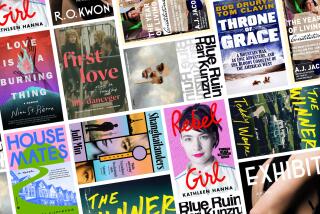Delightful essays of life’s ups, downs in ‘I Love You’
- Share via
THE most important factor to consider in judging autobiographical writing is not whether it is true; fundamentally, who cares if someone you’ve never met is telling you lies in order to better entertain you? What is important is whether the persona the author creates is someone the reader wants to spend several hours with.
The narrator’s ability to engage the reader trumps even the inherent interest of the events being written about. While less likable writers can’t produce a palatable account of even the most thrilling adventure, Jonathan Ames can write about an intimate itching problem in his new essay collection, “I Love You More Than You Know,” and create something utterly delightful.
I had moments of paralyzing laughter while reading these essays, but while Ames is certainly funny, his real gift is his generosity of spirit. He is self-deprecating in the extreme, as in “Our Selves Between Us,” where he writes about a closet empty after a lover’s departure, “I put some of my raggedy clothes in there and they look ugly. They look like me.” Of course many writers, musicians and filmmakers are self-deprecating, but Ames, unlike most people, is not masking a poisonous loathing of everyone else.
Whether he is writing about a Parisian whore (“There was nothing mean about her. She had only been kind to me.”), a German stripper (“the power of the life-giving female breast!”), or his feelings for his great-aunt Doris (“my love seems to be picking up velocity, overwhelming me almost.”), Ames writes with such deep affection for every person except for himself that even the saddest of his essays (and some of these essays are quite sad) are strangely uplifting. Even when proclaiming his admiration for artists whose popularity has always puzzled and annoyed me (Jack Kerouac, Jim Morrison, Kurt Cobain), Ames himself never annoyed me.
Of course anyone willing to expose the darkest, strangest episodes of their lives almost always provokes fascination, and Ames writes of visiting a swingers’ club, encountering drunken transvestites and staggering around Berlin in a drunken haze. In “Self-Sentenced,” Ames reveals his admiration for Charles Bukowski, and although “I Love You More Than You Know” does not provide the thrilling wallow in the author’s depravity that the best of Bukowski’s work does, it still provides plenty of voyeuristic thrills. If Ames is a genial tour guide to life’s seamy underbelly, he also turns out to be a gifted chronicler of the banal: “The Most Phallic Building in the World” is a five-day diary about, among other things, buying fruit and walking past the bank and should, by all rights, be stultifying. Instead, it holds its own with even the seediest material in the book.
Sprinkled throughout are definitions Ames originally wrote for “The Future Dictionary of America,” published by McSweeney’s. These are mildly entertaining, but these pieces suffer mightily in comparison to the pieces featuring Ames’ best creation, Jonathan Ames. Fortunately, none of the definitions is more than a page long and all are printed in a different font, and are, therefore, easily skippable.
It’s typical in any collection of short works that some will stand out from the crowd; this is the “singles and filler” phenomenon familiar to music fans. “I Love You More Than You Know” certainly has peaks and valleys, but, by the end of the book, Ames touches on nearly all of the most profound feelings and experiences one can have. For in these essays, Ames visits parenting, the aging of beloved relatives and oneself, love, heartbreak, self-doubt, art, lust and the incomprehensible death of a friend.
One of the reasons we read memoir, autobiography and, for that matter, fiction, is simply to be reassured that others have visited the same wonderful and awful moments in life that we have, that we are not as horribly alone as we sometimes feel. Although writing about oneself may seem the ultimate act of narcissism, it can also be a gift to others, a hand to hold in the darkness. “I Love You More Than You Know” is just such a gift, and it is a delight to unwrap.
Brendan Halpin’s latest novel is “Long Way Back.”
More to Read
Sign up for our Book Club newsletter
Get the latest news, events and more from the Los Angeles Times Book Club, and help us get L.A. reading and talking.
You may occasionally receive promotional content from the Los Angeles Times.










